精读4unit4tigers and lions and bears
现代大学英语精读4 Unit Four

We have a good/bad/wonderful view of the mountains from our balcony.
The visitors gradually disappeared/vanished from view.
2. ①Curl up: to move so that you are lying or sitting with your arms and legs bent close to your body 蜷缩 eg: 我只想蜷着身体睡觉。 I just wanted to curl up and go to sleep. 萨拉蜷缩在沙发上。
Belvedere Castle is to the south of Delacorte Theater. Belvedere means "beautiful view" or "panoramic view" in Italian. It offers visitors a wonderful view. It is now home to the Henry Luce Nature Observatory, where simple displays show how naturalists observe the world.
different ways of “looking”
General Verbs: to look/see/ watch Specific Verbs: to scan/glimpse/glare/stare/gaze/glance/peep/ peek/eye/spot
现代大学英语精读4第四课正文lions and tigers and bears部分

stroll
v散步,闲逛,(体育赛事)轻而易举获胜 n 散步溜达,(竞赛中)轻易获胜
意为散步闲逛 amble promenade saunter
paraphrase :all sense of direction obliterated
• to obliterate: to get rid of摆脱; to rub out or blot 擦掉 • I lost my sense of direction. • I didn’t know where I was or where I was going
比较:wander , ramble , roam , meander
• wander与ramble强调没有固定路线或目标 • Roam强调行动的自由性,通常指在一片广阔的土地上 • Meander表示轻闲地,有时是无目标地漫步走过一条不规则的或
者曲折的路线
as I turned left again, I saw the lake...
When I finally realized where I was in the Ramble...
It is a 38-acre wild garden in Central Park with rocky outcrops, secluded glades and a tumbling stream, built for visitors to stroll in (hence the name).
The lake is the largest body of water (excluding the Reservoir) in Central Park. It was created out of a large swamp in the south of the Park and was intended for boating in the summer and iceskating in the winter. Many visitors are content, however, to circle the lake on foot, following the pathways that wind along its shoreline, watching the Park’s tree-line shifting in its reflection.
现代大学英语(第二版)Unit4-Lions-and-Tigers-and-BearsPPT课件
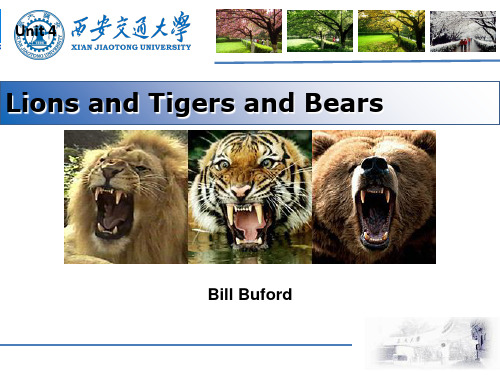
Bill Buford
Lions and Tigers and Bears
Xi’an Jiaotong University
Lions and Tigers and Bears
• Warming-up Questions • Background Information • Text Analysis • Language study • Vocabu现方式做保护处理对用户上传分享的文档内容本身不做任何修改或编辑并不能对任何下载内容负责
Unit 4 Lions and Tigers and Bears
Xi’an Jiaotong University
Lions and Tigers and Bears
Lions and Tigers and Bears
Night here is silent, but not peaceful…
2021/3/29
.
The night in the Central Park
15
Lions and Tigers and Bears
The Ramble (漫步园)
Xi’an Jiaotong University
Central Park
Xi’an Jiaotong University
the urban wonders of the world, a green oasis in the great concrete, high-rise landscape of New York City
Lions and Tigers and Bears
Lions and Tigers and Bears
Three different roles in life
现代大学英语精读4第四课正文lions and tigers and bears解读

●Such fine particles suspend readily in water . ●They decided to suspend trade with that country. ●The policeman was suspended while the complaint was
● 9.用在一个解释性的分句或句子前面。eg:How lucky the girls nowadays are!—they can go anywhere,say anything.今天的女孩子多幸福啊!她们哪都能去,什么话都能说。
● 10.用来表示从……到……的概念,尤指生卒年份。eg:William Shakespeare,1564—1616.
• raise oneself upon a tiptoe: 踮起脚尖站着
• on tiptoe: 踮脚
• tiptoe position:足尖站立
• tiptoe gait :脚尖步
• 译:我踮着脚尖走过去在石 头上坐了下来,又一次欣赏 这令人安心的城市的美景。
look around:朝四周看
● scan : 细查,扫视 ● glimpse : 瞥见,简短的一瞥 ● glare : 怒目而视 ● stare : 凝视 ● gaze : 集中注意力看,凝视 ● glance :粗略的看一下,扫视 ● peep : 窥视,偷窥 ● peek :瞥一眼,偷窥 ● peer : 细看
Paragraph 6
About fifteen feet into……above the stern.
●About fifteen feet into the lake , there was a large boulder , with a heap of branches leading to it.
英语优秀课件Unit4-Lions--Tigers-and-Bears-by-WEI-Zheng-2
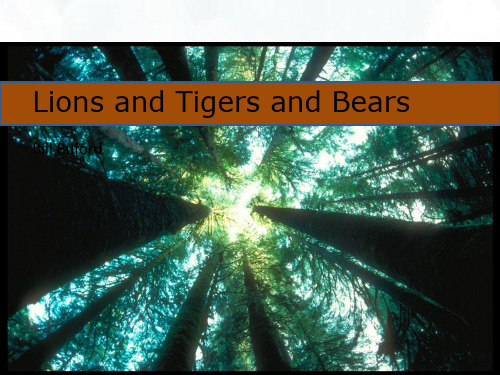
Text Analysis Theme
Adventure vs Tranquillization
Adventure:
-exploration
{ -alternative leisure
novelty stimulation
Tranquillization:
-peaceful life
-without much challenges
• Why is should used here?
Text Analysis Detailed Analysis
Part I My decision on sleepover (paras1-2)
• Or a purse snatcher, loon, prostitute, drug dealer, murderer-not to mention bully, garrotter, highway robber (para.2)
• Setting: • Place: New York • Time: a muggy evening in July
Warming up Objectives
Central Park, New York
Warming up Objectives
Central Park, New York
Warming up Objectives
Text Analysis Detailed Analysis
Part I My decision on sleepover (paras1-2)
• …drop off to a peaceful, outdoorsy sleeppara.1) • What’s the meaning of drop off and drop sb. Off respectively? • Any differences between them? And give some examples.
(完整版)精读4unit4tigersandlionsandbears
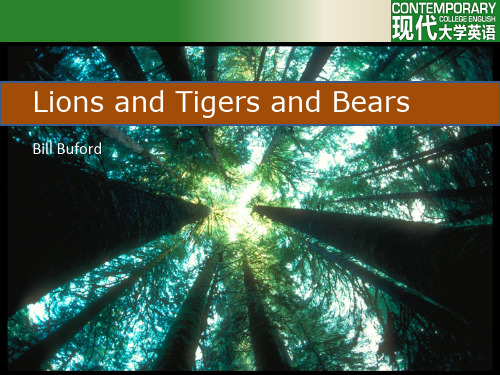
Questions / Activities Check-on Preview Objectives
Warming up
WB TR
Warming up Questions / Activities
What do you know about Central Park? Do you know what New Yorkers think of Central Park?
Background The Central Park
The founding commissioners of Central Park • the city officials who were appointed to establish Central Park. •A commissioner is an important official who has responsibility in a government department or an organization: There is a commissioner in charge of the London police force.
stock merchandize in a drugstore.
– It is a cultural tradition in America to put on free Shakespeare productions in summer.
Text Analysis Detailed Analysis
• Central Park history, places and views in Central
Park, the fear the park inspires, noted peopleW B
现代大学英语(第二版)Unit4 Lions and Tigers and Bears

to allow New Yorkers to experience a day in the
pastoral country without leaving the island city. • Another style is Classicism characterized by formal symmetry and the use of straight lines, evident in the south end of the Park.
The founding commissioners of Central Park were the
landscape architects Frederick Law Olmsted and Calvert Vaux. The two designed and oversaw the first-phase
our citywide campus and
our common backyard. “a garden for all as private Eden”
Lions and Tigers and Bears
Lions and Tigers and Bears
The Delacorte Theater
Lions and Tigers and Bears
Introduction to Bill Buford
Lions and Tigers and Bears
Introduction to Bill Buford
Bill Buford is a staff writer and European correspondent for the New Yorker, where he was previously the fiction editor for eight years. He was the editor-in-chief for Granta magazine for sixteen years and was also the publisher of Granta Books. He is the author of Among the Thugs. He lives in New York City.
Lions-and-Tigers-and-Bears课文翻译
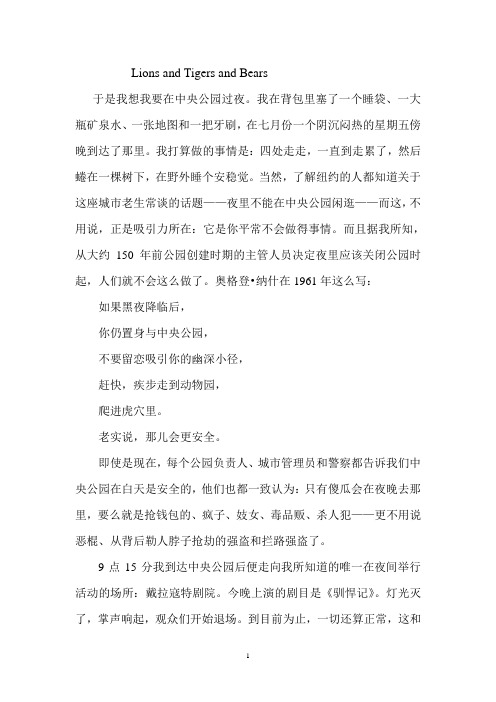
Lions and Tigers and Bears于是我想我要在中央公园过夜。
我在背包里塞了一个睡袋、一大瓶矿泉水、一张地图和一把牙刷,在七月份一个阴沉闷热的星期五傍晚到达了那里。
我打算做的事情是:四处走走,一直到走累了,然后蜷在一棵树下,在野外睡个安稳觉。
当然,了解纽约的人都知道关于这座城市老生常谈的话题——夜里不能在中央公园闲逛——而这,不用说,正是吸引力所在:它是你平常不会做得事情。
而且据我所知,从大约150年前公园创建时期的主管人员决定夜里应该关闭公园时起,人们就不会这么做了。
奥格登•纳什在1961年这么写:如果黑夜降临后,你仍置身与中央公园,不要留恋吸引你的幽深小径,赶快,疾步走到动物园,爬进虎穴里。
老实说,那儿会更安全。
即使是现在,每个公园负责人、城市管理员和警察都告诉我们中央公园在白天是安全的,他们也都一致认为:只有傻瓜会在夜晚去那里,要么就是抢钱包的、疯子、妓女、毒品贩、杀人犯——更不用说恶棍、从背后勒人脖子抢劫的强盗和拦路强盗了。
9点15分我到达中央公园后便走向我所知道的唯一在夜间举行活动的场所:戴拉寇特剧院。
今晚上演的剧目是《驯悍记》。
灯光灭了,掌声响起,观众们开始退场。
到目前为止,一切还算正常,这和美国任何地方在室外上演的莎士比亚夏令剧目没什么不同,除了一点:一辆警车此时正醒目地停在人们的视野中,车顶上的灯正缓慢地旋转着。
警察在那里是为了让观众放心,使他们相信他们正受到保护;旋转着的红色警灯就像野外的篝火,警告四周存在的威胁不要靠近。
在来到公园的大约一个小时里,我漫步在戴拉寇特剧院周围,灯光、笑声以及回荡在这个夏夜里的莎士比亚戏剧的台词都让我感到安心。
我独自一人爬着眺望台城堡的台阶,透过亨利•卢斯自然气象台的窗户向内望去,辨认着莎士比亚花园里的香草,我当时感到很兴奋。
我转来转去,走到了一条被密不透风的树叶遮挡的蜿蜒小路上,然后,不到几分钟,我就迷路了。
前面有灯光,当我转过街角时,遇见了5个人,他们都穿着白色T恤衫,挤在一条长凳旁。
现代大学英语精读4第四课正文lions and tigers and bears段落
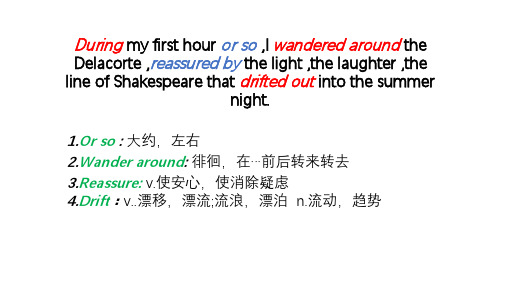
• 1.徘徊,在…附近转来转去,四处流浪的 • 2.回想到,想起 • 3.偏离,从…离开 • 4.迷失,离群,走散,偏离正途 • 5.漫步在,闲逛
Drift v..漂移,漂流;流浪,漂泊 n.流动,趋势;雪堆;主旨大意;偏航;不作为
• 1.drift out • 2.drift away • 3.drift down • 4.drift apart
• 例:他在巴黎期间,与他的朋源自在一起。• During he was in Paris , he lived whit his friends.
(F)
• During he stay in Paris , he lived whit his friends.
(T)
During …
• 2.During和for的区别。
night.
1.Or so : 大约,左右 2.Wander around: 徘徊,在…前后转来转去 3.Reassure: v.使安心,使消除疑虑 4.Drift:v..漂移,漂流;流浪,漂泊 n.流动,趋势
During …
• 1.During表示 在....期间 ,是介词,不要将其误用成连词。
When, after turning this way and that , I was on a winding trail in impenetrable foliage , and , within minutes , I was lost.
• 当时,我转来转去,走到了一条被密不透风的树叶遮挡的蜿蜒小 路上,然后,不到几分钟,我就迷路了。
• 散开,蔓延 • 慢慢飘走,逐渐离去 • 飘落,珊珊离去,随波逐流而去 • 分开,疏远,各奔东西
During my first hour or so ,I wandered around the Delacorte ,reassured by the light ,the laughter ,the line of Shakespeare that drifted out into the summer
LESSON 4 Lions and Tigers and Bears
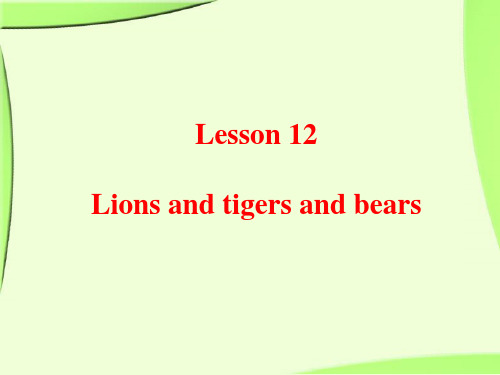
newscast heard on the air would ________
listeners in the story so they’d buy the paper to get more information.
To find yourself in Central Park,
Ignore the paths that beckon you
And hurry, hurry to the zoo,
And creep into the tiger’s lair.
Frankly, you’ll be safer there.
the public, Central Park is our citywide campus and our common backyard.
“a garden for all as private
Eden”
Central Park
In Central Park Roller skating
has always
audience members chose to stay at home and be
entertained Likewise, when a football game was _________. stands were often empty shown on the air, the _______
• his movement in the Central Park, the events and famous people associated with its history, the beauty of New York at night seen from its heart, the crime the park has witnessed and the fear it has inspired. The author writes in an engaging style, varying the pace as well as the tone of this narration with a charming rhythm.
大学教材全解—现代大学英语精读(4)(第二版)

大学教材全解—现代大学英语精读(4)(第二版)基本信息作者:考拉进阶《大学教材全解》编委会出版社:中国海洋大学出版社主编:石满霞石峦出版时光:2023年年3月字数:750千字版次:1页数:416印刷时光:2023年年1月开本:异16开印次:3纸张:轻型纸I S B N :978-7-5670-0246-3包装:平装定价:29.8内容简介“教材全解”系列图书多年来向来是初高中学生的首选辅导材料,每年销售量位居同类辅导书首位,协助千万学子取得了理想的成绩。
如今我们秉持“全解”的理念,招聘全国各地治学严谨、业务精湛的一线名师,倾力打造了这套“大学英语教材全解”系列图书,希翼将“全解”精神——全心全意,解疑解难延续到大小学园。
与其他容易、传统的课文辅导类书籍相比,“大学英语教材全解”更先进、更具优势之处在于:一目了然的“知识点预览”帮您疾驰定位每一单元重点核心词汇,便于寻找、复习、自我检测。
第1 页/共10 页全晰透彻的“教材内容全解”编排清晰明了,按照课文天然顺序逐词逐句讲解,逼真模拟课堂教学,明确重点难点,为读者提供课前预习、课上学习、课后复习的全程辅导,助您一臂之力。
多维立体的“考拉进阶异常1+1记忆法”与课文篇章精析完美结合;每个核心必考词都从【记】【考】【串】【辨】【警】【源】【真题再现】几个方面出发,全方位构建记忆大厦,协助读者对词汇举行多层次、多角度的理解。
本书主要大栏目的设置理念为:文化背景衔接:文化,开阔视野。
该栏目为课文中涉及的重要人物、习俗、历史事件、科学技术等提供背景资料,图文并茂,为您打开瞭望西方文化的窗口。
教材内容全解:全解教材,面面俱到。
全面网罗每单元的所有栏目,两篇精读课文中涉及的所有重点难点都用最精炼的语言收拾、分析、解答、点拨。
语法要点归纳:归纳语法,搜索密钥。
本栏目紧扣每单元语法要点,以最精炼的语言,最地道的例句,解除最让人头疼的难题。
专四真题演练:牵手真题,能力跨越。
现代大学英语Unit 4 lions and tigers and bears 课文原文
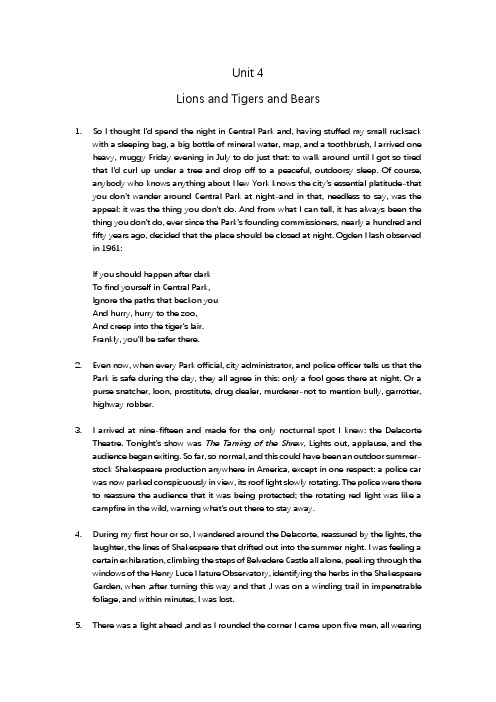
Unit 4Lions and Tigers and Bears1.So I thought I'd spend the night in Central Park and, having stuffed my small rucksackwith a sleeping bag, a big bottle of mineral water, map, and a toothbrush, I arrived one heavy, muggy Friday evening in July to do just that: to walk around until I got so tired that I'd curl up under a tree and drop off to a peaceful, outdoorsy sleep. Of course, anybody who knows anything about New York knows the city's essential platitude-that you don't wander around Central Park at night-and in that, needless to say, was the appeal: it was the thing you don't do. And from what I can tell, it has always been the thing you don't do, ever since the Park's founding commissioners, nearly a hundred and fifty years ago, decided that the place should be closed at night. Ogden Nash observed in 1961:If you should happen after darkTo find yourself in Central Park,Ignore the paths that beckon youAnd hurry, hurry to the zoo,And creep into the tiger's lair.Frankly, you'll be safer there.2.Even now, when every Park official, city administrator, and police officer tells us that thePark is safe during the day, they all agree in this: only a fool goes there at night. Or a purse snatcher, loon, prostitute, drug dealer, murderer-not to mention bully, garrotter, highway robber.3.I arrived at nine-fifteen and made for the only nocturnal spot I knew: the DelacorteTheatre. Tonight's show was The Taming of the Shrew,Lights out, applause, and the audience began exiting. So far, so normal, and this could have been an outdoor summer-stock Shakespeare production anywhere in America, except in one respect: a police car was now parked conspicuously in view, its roof light slowly rotating. The police were there to reassure the audience that it was being protected; the rotating red light was like a campfire in the wild, warning what's out there to stay away.4.During my first hour or so, I wandered around the Delacorte, reassured by the lights, thelaughter, the lines of Shakespeare that drifted out into the summer night. I was feeling a certain exhilaration, climbing the steps of Belvedere Castle all alone, peeking through the windows of the Henry Luce Nature Observatory, identifying the herbs in the Shakespeare Garden, when ,after turning this way and that ,I was on a winding trail in impenetrable foliage, and within minutes, I was lost.5.There was a light ahead ,and as I rounded the corner I came upon five men, all wearingwhite T-shirts, huddled around a bench. I walked past, avoiding eye contact, and turned down a path, a narrow one, black dark, going down a hill, getting darker, very dark. ThenI heard a great shaking of the bushes beside me and froze. Animal? Mugger? WhateverI was hearing would surely stop making that noise, I thought. But it didn't. How can thisbe? I'm in the Park less than an hour and already I'm lost, on an unlighted, Shit! What amI doing here? And I bolted ,not running, exactly, but no longer strolling-and certainly notlooking back-turning left, turning right ,all sense of direction obliterated, the crashing continuing behind me, louder even, left ,another man in a T-shirt, right, another man, when finally I realized where I was -in the Ramble. As I turned left again, I saw the lake, and the skyline of Central Park South. I stopped, I breathed. Relax, I told myself. It's only darkness.6.About fifteen feet into the lake, there was a large boulder, with a heap of branchesleading to it. I tiptoed across and sat, enjoying the picture of the city again, the very reassuring city. I looked around .There was a warm breeze, and heavy clouds overhead, but it was still hot ,and I was sweating. Far out in the lake, there was a light-someone rowing a boat, a lantern suspended above the stern. I got my bearings. I was on the West Side, around Seventy-seventh. The far side of the lake must be near Strawberry Fields, around Seventy-second. It was where, I realized, two years ago ,the police had found the body of Michael McMorrow ,a forty-four-year-old man(my age), who was stabbed thirty-four times by a group of boys .After he was killed, he was disemboweled, and his intestines ripped out so that his body would sink when rolled into the lake-a detail that I've compulsively reviewed in my mind since I first heard it. And then his killers, with time on their hands and no witnesses, just went home.7.One of the first events in the park took place 140 years ago almost to the day: a handconcert. The concert, pointedly, was held on a Saturday, still a working day, because the concert, like much of the Park then, was designed to keep the city's rougher elements out. The Park at night must have seemed luxurious and secluded-a giant evening garden party. The Park was to be strolled though, enjoyed as an aesthetic experience, like a walk inside a painting. George Templeton Strong, the indefatigable diarist ,recognized, on his first visit on June 11, 1859, that the architects were building two different parks at once, One was the Romantic park, which included the Ramble, the carefully ''designed'' wilderness ,wild nature re-created in the middle of the city .The other, the southern end of the park, was more French: ordered, and characterized by straight lines8.I climbed back down from the rock. In the distance, I spotted a couple approaching. Yourfirst thought is: nutcase? But then I noticed, even from a hundred feet, that the couple was panicking: the man was pulling the woman to the other side of him, so that he would be between her and me when we passed. The woman stopped, and the man jerked her forward authoritatively. As they got closer, I could see that he was tall and skinny, wearinga plaid shirt and black horn-rimmed glasses; she was a blonde, and looked determinedlyat the ground, her face rigid. When they were within a few feet of me, he reached out and grabbed her arm. I couldn't resist: just as we were about to pass each other, Iaddressed them , forthrightly: ''Hello, good people!'' I said, ''And how are you on this fine summer evening?'' At first, silence, and then the woman started shrieking uncontrollably-''Oh, my God! Oh my God!''-and they hurried away.9.This was an interesting discovery. One of the most frightening things in the Park at nightwas a man on his own. One of the most frightening things tonight was me .I was emboldened by the realization: I was no longer afraid; I was frightening.10.Not everyone likes the Park, but just about everyone feels he should. This was at theheart of Henry James's observations when he visited the Park, in 1904.The Park, in James's eyes, was a failure, but everyone, as he put it, felt the need to ''keep patting the Park on the back.'' By then, the Park's founders had died, and the Park, no longer the domain of the privileged, had been taken over by immigrants. In fact, between James's visit and the nineteen-thirties, the Park might have been at its most popular, visited by ten to twenty million a year. The Park in fact was being destroyed by overuse, until 1934, when the legendary Robert Moses was appointed the Park's commissioner. Moses was responsible for the third design element in the Park-neither English nor French, neither Romantic nor classical, but efficient, purposeful, and unapologetically American. He put in baseball diamonds, volleyball courts, and swimming pools. He even tried to turn the Ramble intoa senior citizen's recreation center, but was stopped by the protesting bird-watchers. Theirony was that by the end of the Moses era the Park was dangerous.11.In my new confidence I set out for the northern end of the Park. Near the reservoir, agang of kids on bicycles zoomed across the Eighty-fifth Street Transverse, hooting witha sense of ominous power. A little later, there was another gang, this one on foot-abouta dozen black kids, moving eastward, just by the running track. I kept my head down andpicked up my pace, but my mind involuntarily called up the memory of the 1989 incident, in which a young investment banker was beaten and sexually assaulted by a group of kids on a rampage.12.Around Ninety-fifth Street, I found a bench and stopped .I had taken one of the trailsthat run alongside the Park's West Drive, and the more northern apartments of Central Park West were in view ,I sat as residents prepared for bed: someone watching television ,a woman doing yoga, a man stepping into the shower. Below me was the city, the top of the Empire State Building peeking over the skyline. George Templeton Strong discovered the beauty of Central Park at night on July 30, 1869, on a ''starlit drive'' with his wife. But tonight, even if it weren't clouding over, there'd be no stars. Too much glare.The Park is now framed, enveloped even, by the city , but there was no escaping the recognition that this city--contrived, man-made, glaringly obtrusive, consuming wasteful and staggering quantities of electricity and water and energy -was very beautiful. I'm not sure why it should be so beautiful; I don't have the vocabulary to describe its appeal. But there it was: the city at night, viewed from what was meant to be an escape from it, shimmering.13.I walked and walked. Around one-thirty, I entered the North Woods, and made my waydown to what my map would later tell me was a stream called the Loch. The stream was loud, sounding more like a river than a stream. And for the first time that night the city disappeared: no buildings, no lights, no sirens.14.I was tired. I had been walking for a long time. I wanted to unroll my sleeping bag, outof view of the police, and fall asleep. I was looking forward to dawn and being awakened by birds.15.I made my way down a ravine. A dirt trail appeared on my left .This looked promising. Ifollowed it, and it wound its way down to the stream. I looked back: I couldn’t see the trail; it was blocked by trees. This was good. Secluded. I walked on. It flattened out and I could put a sleeping bag here. This was good, too. Yes: good. There were fireflies, even at this hour ,and the place was so dark and so densely shrouded by the trees overhead that the light of the fireflies was hugely magnified; their abdomens pulsed like great yellow flashlights.16.I eventually rolled out my sleeping bag atop a little rise beside the bridle path by theNorth Meadow, and then I crawled inside my bag and closed my eyes. And then: snap!A tremendous cracking sound. I froze, then quickly whipped round to have a look:nothing. A forest is always full of noises. How did I manage to camp out as a kid? Finally,I fell asleep.17.I know I fell asleep because I awake again. Another branch snapping, but this sound wasdifferent-as if I could hear the tissue of the wood tearing. My eyes still closed , I was motionless .Another branch , and then a rustling of leaves. No doubt: someone was there.I could tell I was being stated at ;I could feel the staring. I heard breathing.18.I opened my eyes and was astonished by what I saw. There were three of them, all withinarm's reach. They looked very big. At first I didn't know what they were, except that they were animals. Maybe they were bears, small ones. Then I realized; they were-what do you call them? Those animals that Daniel Boone made his hat out of.19.They weren't moving; I wasn't moving. They just stared, brown eyes looking blankly intomy own. They were obviously very perplexed to find me here. Suddenly, I was very perplexed to find me here, too. ''Imagine this,'' one of them seemed to be saying. ''A grown man sleeping out in Central Park!''20.''Obviously, not from New York.'21.''Hi, guys,'' I muttered. I said this very softly.22.My voice startled them and they scurried up the tree in front of me. Then they stoppedand resumed staring. And then, very slowly, they inched farther up. They were now aboutforty feet directly above me, and the tree was swaying slightly with their weight.23.It was starting to drizzle. I heard a helicopter, its searchlight crisscrossing the path onlyten feet away. So maybe there were bad guys.24.I looked back at the raccoons. ''Are there bad guys here?'' I asked them. It was stupid tospeak. My voice startled them and, directly overhead, one of them stared peeing. And then, nature finding herself unable to resist, it started to pour.25.But not for long. The rain stopped, and I fell sleep. I know I fell asleep because the nextthing I heard was birds. A naturally beautiful sound.。
现代大学英语4 Unit4 lions and tigers and bears_language study

cliché ; commonplace; banal
陈腐平凡的,老生常谈,陈词滥调
W
B
T
L
E
To be continued on the next page.
Unit 4 – Lions and Tigers and Bears
I.
Word Study
Example:
This speech was full of empty platitudes about (of) peace and democracy.
I came upon an old friend when I was shopping in the store. Fear came upon her as she waited.
W
B
T
L
E
Unit 4 – Lions and Tigers and Bears
II.
2.
Phrases and Expressions
W
B
T
L
E
To be continued on the next page.
Unit 4 – Lions and Tigers and Bears
I.
Word Study
Examples: a) He bolted out of his house. b) Eyes bolted towards the stranger.
II.
3.
Phrases and Expressions
drift out (口)不经意(慢吞吞)走出来,走开,离开
Example: The smoke pall drifted out to reveal the blackened shell of the building.
最新现代大学英语第二版精读Unit4lions and tigers and bears单词
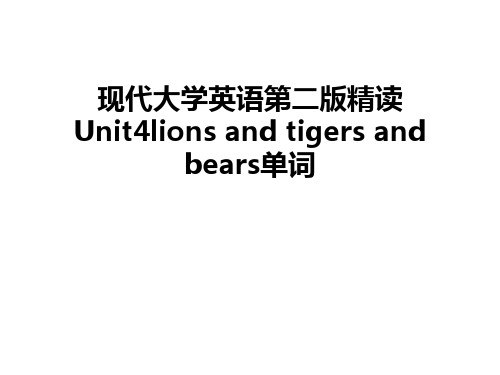
• glare /ɡlɛə/ CET6 TEM4 ( glaring, glared, glares ) • 1. V-I glare at sb 怒目而视 • 例:The old woman glared at him. • 那个老妇人怒视着他。 • 2. N-COUNT 怒视 • 例:His glasses magnified his irritable glare. • 他的眼镜使他怒视的目光显得更凶了。 • 3. V-I 发出刺眼的光 • 例:The sunlight glared.太阳光很刺眼。 • 4. N-UNCOUNT 刺眼的光 • 例:...the glare of a car's headlights.…汽车前灯刺眼的强光。 • 5. N-SING the glare of publicity or public attention显眼; 张扬 • 例:Norma is said to dislike the glare of publicity. • 据说诺尔玛不喜欢张扬。
• 艾伦对政治根本不关心。
• horn-rimmed adj. (指眼镜)角质架的 • horn n. 喇叭,号角;角
• impenetrable /ɪmˈpɛnɪtrəbəl/ TEM8 • 1. ADJ (障碍或森林等) 难以穿越的 • 例:...the Caucasus range, an almost impenetrable
• bolt /bəʊlt/ CET4 TEM4 ( bolting, bolted, bolts ) • 1. N-COUNT 螺钉 • 2. V-T 栓牢 • 例:Bolt the components together. • 把所有的部件栓接起来。 • 3. N-COUNT (门或窗的)闩 • 例:I heard the sound of a bolt being slowly and reluctantly slid open. • 我听到门闩被人缓慢而费劲地抽出来的声音。 • 4. V-T 闩 (门或窗) • 例:He reminded her that he would have to lock and bolt the kitchen door
词源分析在英语专业精读课篇章理解中的作用--以《现代大学英语精读》为例

“etymology(词源)”源自希腊语词“étumos(真
实的)”,以“etymon(词的本义或最初形式)”的形 式进入英语词汇,最后以“etymology”的拼写形式稳 定下来。从广义而言,词源研究的是词的来源与历 史,包括词性与词义的变化,以及对由其他语言引入 的借词所作的研究等[3]。词源的丰富内涵对外语学 习者的词汇学习可起到补充和强化作用。首先,在 文化方面,词源信息从词的溯源向学习者展示该词 的文化内涵,使学习者知其然亦知其所以然。譬如, 《精 读 3》第 四 课 Diogenes and Alexander 中 作 者 这 样描述亚历山大帝:“and toward women,he was nobly restrained and chivalrous”。学 生 通 过“chivalrous”一 词 的词源可以了解到西方历史上的骑士制度(chivalry) 及其对英国绅士文化形成的影响,加深对课文人物 形象塑造的理解。在词法层面,英语词汇的长期演 变决定了英语构词法的多样性,查阅词源信息可以 对词汇的构成方式有较为直接的了解,有助于词汇 的有效记忆和猜词能力的培养。《精读 4》第四课 Lions and Tigers and Bears 出现的新词“indefatigable”, 该 词 虽 生 僻 却 可 通 过 词 源 推 断 其 词 义,其 词 源 信 息 显 示 该 词 由 三 部 分 构 成:in-‘not’+de-‘away, completely’+fatigare ‘wear out’,组 合 起 来 即“孜 孜
84
不 倦 的;坚 持 不 懈 的”之 意。在 词 义 方 面,有 些 词 语的词源展示了词义扩大、缩小、升格和降格的变 化,了解词语在某个特定历史时期的意义对于理解 词语所在的语境有很大帮助。如《精读 4》第二课 Spring Sowing 中“shrewd”一 词,“shrewd”是“shrew (‘evil person or thing’)”的 变 体,本 指“evil in nature or character”,后来其贬义色彩逐渐褪去,取而代之 的 是 如 今 广 为 人 知 的 褒 义 涵 义“having or showing sharp powers of judgment(精明的,机敏的)”,因此莎 士 比 亚 喜 剧“The Taming of the Shrew(驯 悍 记)”中 “shrew”指的是“悍妇”,而课文句子“Mary,with her shrewd woman’s mind...”中“shrewd”的意思则是“敏 锐的;灵敏的”。在语用方面,词源信息可以明确词 汇使用的规范性,引导学习者通过词语的语体色彩 体会文章的文体色彩,从而提高学习者用词的准确 度。如《精读 3》第十一课 Why Historians Disagree,作 者 说 道:“‘truth’is but an elusive yet intriguing goal in a never-ending quest.” quest 属 于 书 面 用 语,意 为“探 索”,了解其语体色彩不仅可用于辨析近义词而且有 助于把握文章整体语言风格。由此可见,词源信息既 可提高学习者的文化认知,也能帮助学习者挖掘词 语之间在结构上的联系,了解词义的扩大与缩小、扬 升与贬降、弱化与转移等,增加对词语语体色彩的了 解,提升语言运用的得体性[4]。
Unit 4 Lions, Tigers and Bears
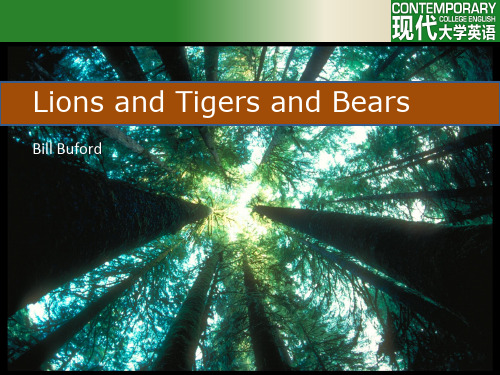
• Why?
– Only a fool, a loon or bad people goes there at night.
Phrases and Expressions
drop off (口)入睡,睡着;(逐个)走开,消失; 放下,下降,掉下 Examples: She dropped off in front of the fire while watching TV. Her friends dropped off into the shadows. Can you drop me off at a supermarket?
Sentence Paraphrase 1
Anybody who knows anything about New York knows the city’s essential platitude—that you don’t wander around Central Park at night—and in that, needless to say, was the appeal: it was the thing you don’t do.(Para. 1)
Lions and Tigers and Bears
Bill Buford
Lions and Tigers and Bears
Unit 4
W arming up
B ackground
T ext Analysis R einforcement
Lions and Tigers and Bears
Questions / Activities Check-on Preview Objectives
there are many colleges, universities and technical schools,
现代大学英语精读4第四课正文lionsandtigersandbears课文原文带段落教学总结
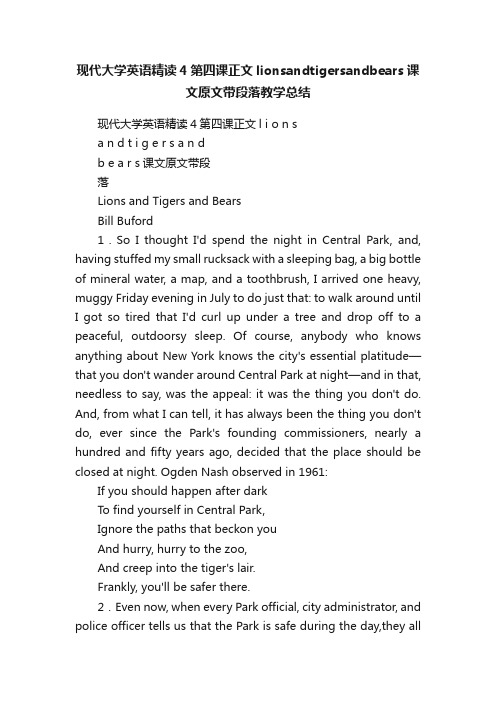
现代大学英语精读4第四课正文lionsandtigersandbears课文原文带段落教学总结现代大学英语精读4第四课正文l i o n sa n d t i g e r s a n db e a r s课文原文带段落Lions and Tigers and BearsBill Buford1.So I thought I'd spend the night in Central Park, and, having stuffed my small rucksack with a sleeping bag, a big bottle of mineral water, a map, and a toothbrush, I arrived one heavy, muggy Friday evening in July to do just that: to walk around until I got so tired that I'd curl up under a tree and drop off to a peaceful, outdoorsy sleep. Of course, anybody who knows anything about New York knows the city's essential platitude—that you don't wander around Central Park at night—and in that, needless to say, was the appeal: it was the thing you don't do. And, from what I can tell, it has always been the thing you don't do, ever since the Park's founding commissioners, nearly a hundred and fifty years ago, decided that the place should be closed at night. Ogden Nash observed in 1961:If you should happen after darkTo find yourself in Central Park,Ignore the paths that beckon youAnd hurry, hurry to the zoo,And creep into the tiger's lair.Frankly, you'll be safer there.2.Even now, when every Park official, city administrator, and police officer tells us that the Park is safe during the day,they allagree in this: only a fool goes there at night.Or a purse snatcher, loon, prostitute, drug dealer, murderer—not to mention bully, garrotter, highway robber.3.I arrived at nine-fifteen and made for the only nocturnal spot I knew: the Delacorte Theatre.Tonight's show was The Taming of the Shrew.Lights out, applause, and the audience began exiting.So far, so normal, and this could have been an outdoor summer-stock Shakespeare production anywhere in America,except in one respect: a police car was now parked conspicuously in view, its roof light slowly rotating.The police were there to reassure the audience that it was being protected;the rotating red light was like a campfire in the wild, warning what's out there to stay away.4.During my first hour or so, I wandered around the Delacorte, reassured by the lights, the laughter,the lines of Shakespeare that drifted out into the summer night.I was feeling a certain exhilaration, climbing the steps of Belvedere Castle allalone,peeking through the windows of the Henry Luce Nature Observatory, identifying the herbs in the Shakespeare Garden,when, after turning this way and that, I was on a winding trail in impenetrable foliage, and, within minutes, I was lost.5.There was a light ahead, and as I rounded the corner I came upon five men, all wearing white T-shirts, huddled around a bench.I walked past, avoiding eye contact, and turned down a path, a narrow one, black dark, going down a hill, getting darker, very dark.Then I heard a great shaking of the bushes beside me and froze.Animal? Mugger? Whatever I was hearing would surely stop making that noise, I thought.But it didn't. How can this be?I'm in the Park less than an hour and already I'm lost, on an unlighted path,facing an unknown thing shaking threateningly inthe bushes, and I thought, Shit! What am I doing here?And I bolted, not running, exactly, but no longer strolling—and certainly not looking back—turning left, turning right, all sense ofdirection obliterated,the crashing continuing behind me, louder even, left, another man in a T-shirt, right, another man,when finally I realized where I was—in the Ramble.As I turned left again, I saw the lake, and the skyline of Central Park South.I stopped. I breathed. Relax, I told myself. It's only darkness.6.About fifteen feet into the lake, there was a large boulder, with a heap of branches leading to it.I tiptoed across and sat, enjoying the picture of the city again, the very reassuring city.I looked around. There was a warm breeze, and heavy clouds overhead, but it was still hot, and I was sweating.Far out in the lake, there was a light—someone rowing a boat, a lantern suspended above the stem.I got my bearings.I was on the West Side, around Seventy-seventh.The far side of the lake must be near Strawberry Fields, around Seventy-second.It was where, I realized, two years ago, the police had found the body of Michael McMorrow, a forty-four-year-old man (my age),who was stabbed thirty-four times by a fifteen-year-old.After he was killed, he was disemboweled, and his intestines ripped out so that his body would sink when rolled into the lake—a detail that I've compulsively reviewed in my mind since I first heard it.And then his killers, with time on their hands and no witnesses, just went home.7.One of the first events in the park took place 140 years ago almost to the day: a band concert.The concert, pointedly, was held on a Saturday, still a working day, because the concert, like much of the Park then, was designed to keep the city's rougherelements out.The Park at night must have seemed luxurious and secluded—a giant evening garden party.The Park was to be strolled through, enjoyed as an aesthetic experience, like a walk inside a painting.George Templeton Strong, the indefatigable diarist, recognized, on his first visit on June 11, 1859, that the architects were building two different parks at once.One was the Romantic park, which included the Ramble, the carefully "designed" wilderness, wild nature re-created in the middle of the city.The other, the southern end of the Park, was more French: ordered, and characterized by straight lines.8.I climbed back down from the rock. In the distance, I spotted a couple approaching.Your first thought is: nutcase?But then I noticed, even from a hundred feet, that the couple was panicking:the man was pulling the woman to the other side of him, so that he would be between her and me when we passed.The woman stopped, and the man jerked her forward authoritatively.As they got closer, I could see that he was tall and skinny, wearing a plaid shirt and black horn-rimmed glasses;she was a blonde, and looked determinedly at the ground, her face rigid.When they were within a few feet of me, he reached out and grabbed her arm.I couldn't resist: just as we were about to pass each other, I addressed them, forthrightly: "Hello, good people!"I said. "And how are you on this fine summer evening?"At first, silence, and then the woman started shrieking uncontrollably—"Oh, my God! Oh, my God!"—and they hurried away.9.This was an interesting discovery. One of the most frightening things in the Park at night was a man on his own.One of the most frightening things tonight was me.I was emboldened by the realization: I was no longer afraid; I was frightening.10.Not everyone likes the Park, but just about everyonefeels he should.This。
- 1、下载文档前请自行甄别文档内容的完整性,平台不提供额外的编辑、内容补充、找答案等附加服务。
- 2、"仅部分预览"的文档,不可在线预览部分如存在完整性等问题,可反馈申请退款(可完整预览的文档不适用该条件!)。
- 3、如文档侵犯您的权益,请联系客服反馈,我们会尽快为您处理(人工客服工作时间:9:00-18:30)。
• nocturnal • stock • production • in view • rotate • reassure (assure, insure)
• peek
Text Analysis Detailed Analysis
Para 5 – Para 6 Main idea
Text Analysis Detailed Analysis
Para 1- Para 2 Vocabulary development
- heavy; muggy; founding commissioners; city administrators
- Drop off to a peaceful, outdoorsy sleep - names for criminal offenders (para.2)
Lions and Tigers and Bears
Bill Buford
Lions and Tigers and Bears Unit 4
W arming up B ackground T ext Analysis R einforcement
Lions and Tigers and Bears
What’s the weather like? a heavy, muggy day
Heavywarm in a sticky unpleasant way, especially before rain or a storm the sky is heavy; heavy clouds
Muggy warm in an unpleasant way because the air feels wet muggy weather
Background The Central Park
The founding commissioners of Central Park • the city officials who were appointed to establish Central Park. •A commissioner is an important official who has responsibility in a government department or an organization: There is a commissioner in charge of the London police force.
• Where did he visit?
– the Delacorte Theatre – Belvedere Castle – the Henry Luce
Nature Observatory – Shakespeare Garden
Text Analysis Detailed Analysis
2
Para. 3-12
wandering in the park
3
Para. 13-25 my camping: finding a place and the encounter with the raccoons
WB TR
Text Analysis Detailed Analysis
Main Idea
• Why?
– Only a fool, a loon or bad people goes there at night.
Text Analysis Detailed Analysis
Para 1 – Para 2 Difficult words
• Platitude: – (derog) a remark or statement that may be true but is boring and meaningless because it has been said so many times before: – His speech was full of empty platitudes about peace and democracy. – (cf: cliché; commonplace; banal remarks )
Theme
Structure
Detailed Analysis
Text Analysis
WB TR
Text Analysis Theme
We see in this essay:
•the pride and love of the city and the park for its cultural richness and its beauty (both natural and man-made)
stock merchandize in a drugstore.
– It is a cultural tradition in America to put on free Shakespeare productions in summer.
Text Analysis Detailed Analysis
leisure
Text Analysis Detailed Analysis
Para 3 – Para 4 Drawing inferences
• Summer-stock Shakespeare production anywhere in America
– Stock: usually kept in stock and regular available, 常备的 ,e.g. one of our stock items 常备项目;Toothpaste is a
WB TR
Background
Genre
Travel Writing –
The Best Travel Writing 2000
• “Spinning all these elements into an engaging account of a place and a moment –a night at Central Park, Buford enables readers to get a glimpse of something much broader and longer - the history of and life in New York.” - book review
Text Analysis Detailed Analysis
Para 1 – Para 2: Main Idea
• What was Ogden Nash trying to say in his poem?
– The safest place in Central Park at night is the tiger’s lair.
• Appeal: – a quality that something has that makes people like it or want it: – the appeal of horror movie – But that’s the appeal of the place, say many residents and visitors. It’s a place where many come to find a slower pace for a lifetime or just a weekend. – Parties on river-boats have lost their appeal since one sank last year killing thirty-three people.
description
WB TR
Lions and Tigers and Bears Unit 5
The Central Park
Background
Genre
WB TR
Background The Central Park
Frederick Law Olmsted
Calvert Vaux
WB TR
• Central Park history, places and views in Central
Park, the fear the park inspires, noted peopleW B
associated with the park?
TR
Lions and Tigers and Bears
Questions / Activities Check-on Preview Objectives
Warming up
WB TR
Warming up Questions / Activities
What do you know about Central Park? Do you know what New Yorkers think of Central Park?
WB TR
Warming up Check-on Preview
Paraphrase:
Anybody who knows anything about New York knows the city’s essential platitude – that you don’t wander around Central Park at night – and in that, needless to say, was the appeal: it was the thing you don’t do.
Para 3 – Para 4 Main idea
What was his feeling like in this period? Why did he feel like that?
– Exhilaration – (happy, excitement, full of energy) – enjoy / experience the rich cultural flavor the park offers at
